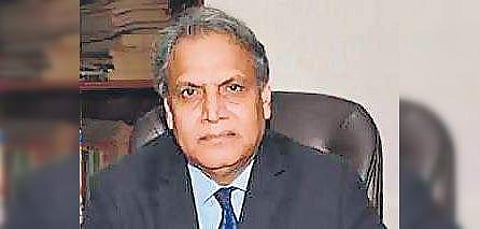

BENGALURU: Access to quality education suggested in the National Education Policy 2020, will happen at the cost of denial of access to large majority of the poor and deprived sections, said former UGC chairman Prof Sukhadeo Thorat on Saturday. He was talking at the academic session of the two day conference by the All India Save Education Committee.
Prof Thorat expounded that the duration of a degree course (with an option of four year degree) not just increases the cost of education making it inacessbile to the poor sections, but also creates a hierarchy within the degree -- some will be bachelor with three years, some with four years -- which disrupts the uniformity of 3 plus 2 years in higher education brought in by the Kothari Commission.
Unitary university is an American concept wherein all UG, PG and PhD are under one shed -- as opposed to the existing system in India of affiliating system where we have a university and hundreds of colleges that are affiliated to it -- geographically limits students from higher education.
At present students go to nearby colleges in small towns and larger villages. Adding to this constraint is NEP's proposal of a larger university in district places -- 360 bigger universities to be setup in districts and putting colleges in cluster universities in medium term.
On privatisation the NEP says it will continue with the policy of non profit university/ institution -- which means they are not allowed to have profit but allowed to have surplus which is to be invested to be university itself -- and we know what a surplus is -- its indirectly a profit, he said.
In addition to privatization, NEP allows 100 foreign universities in the country. fee structure will be such that there will be much less access to the poor. There are other ways of foreign collaboration -- interuniveristy collaboration, joint degree, exchange of teacher and curriculum -- but setting up 100 universities is not only brining competition with domestic universities but also effecting the access to a greater extent, he said.
Online education, he believed, restricts people with limited resources and irregular electricity supply. "40 percent online education will effect the access to higher education to students -- those who stay in small or two rooms -- there is hardly any isolated space where you can listen to the lectures. There is another way -- distance mode education -- where students can go to colleges and teachers from different university," he added.
He said that the National Test for Admission would replace a more liberal method of admissions that are easy for students where they are admitted based on their past percentage.
Meanwhile, historian Irfan Habib accused the the UGC Syllabus of being manifestly racial because it begins with a concern to prove that Indians were the original Aryans. "At the same time they bring the racial issue to India by their manifested anti-Dravidian position in claiming the Indus civilisation for the Aryans," he said.
Explaining the importance of textbooks and offline classes, historian Romila Thapar said that the purpose of a textbook is also toteach students not only to ask questions about the subject but to ask relevant questions from what they are studying. "An aspect of importance in a history textbook is training students to understand the meaning of what we call historical sources," she said.
She added that while oral tradition is significant and should not be treated as something very casually but as with the written tradition it has to be tested for reliability.
Thorat owed the lack of emphasis to access to the NEP committee, which he said is not based in the study of the system -- the way the Kothari or Radhakrishna Commission worked for two years studied all colleges, universities collected the data.